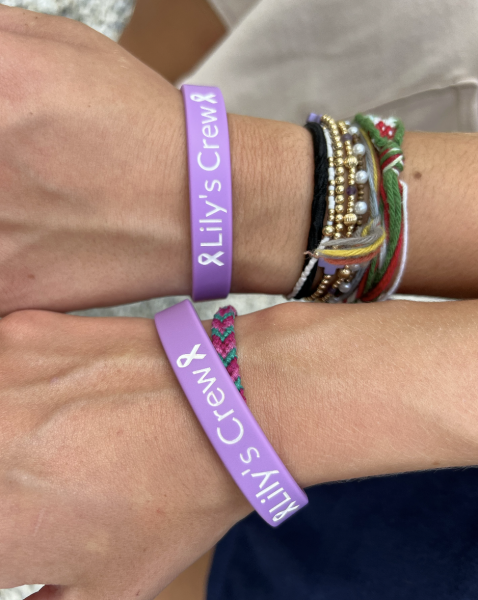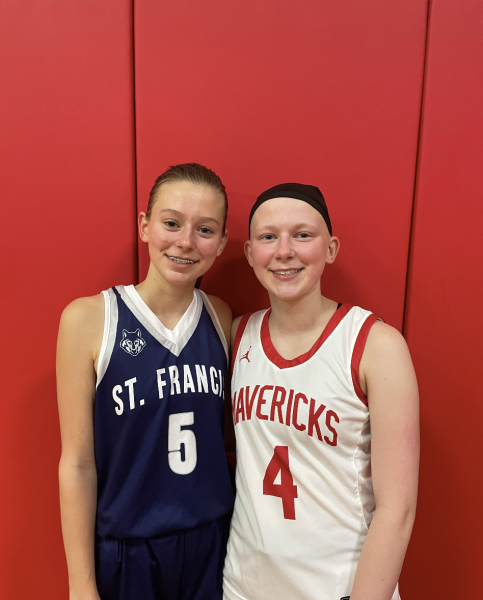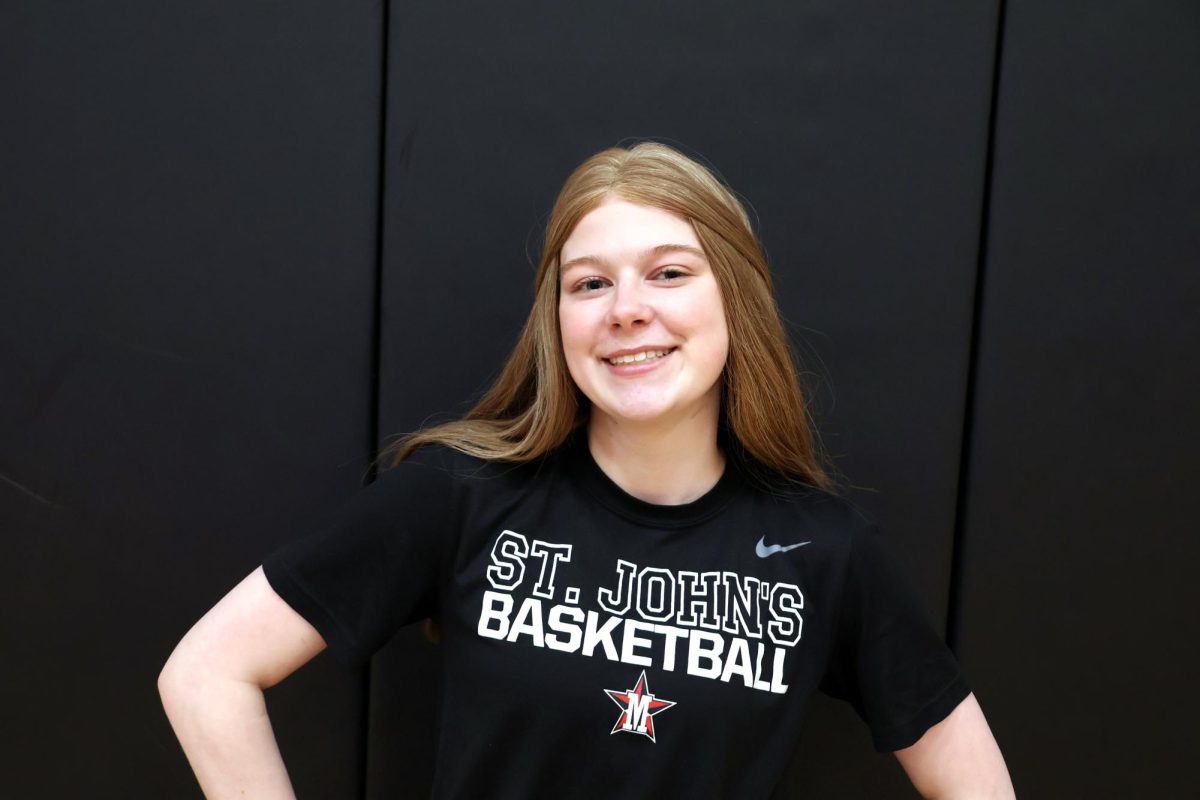When Lily Dunlap discovered she had cancer, her first concern was not the painful chemotherapy treatments nor the exhaustive recovery process. She was worried about breaking the news to her close friends and family.
“I was just thankful that it happened to me and not somebody else that I cared about.”
Resilience has always been a defining trait for the junior. When she was younger, Dunlap had trouble hearing, which doctors believed was a temporary effect of frequent ear infections. When her hearing failed to improve, her parents became concerned.
One evening, as she sat in front of the television watching Mickey Mouse Clubhouse, the four-year-old begged her mother to turn up the volume. Even at maximum volume, Dunlap still struggled to hear more than a stifled sound. Shortly after, Dunlap was diagnosed with moderate bilateral sensorineural hearing loss.
“I have no idea how that happened,” she said. “Technically, I passed my hearing test when I was born.”
Dunlap quickly grew tired of incessant questions about her hearing loss from classmates: “I kind of hated it.” Eventually, she learned to lip-read and grew accustomed to her hearing aids.
Dunlap’s younger brother Joshua was also diagnosed with genetic hearing loss at birth. Aided by her own experience, Dunlap helped him adjust.
Dunlap describes her family as close-knit but competitive, listing family game nights as one of her favorite activities.
“I show no mercy,” Dunlap said. “But I’m also very family-oriented.”
Dunlap was the only student from St. Francis Episcopal School to enter St. John’s in ninth grade. As she adjusted to the new curriculum, she immersed herself in activities including the Maverick Christian Fellowship and basketball. She spent so much time in the weight room that, by the end of the year, Director of Strength, Training and Conditioning Virgil Campbell even bestowed upon her the title of “Girlrilla” — a female student recognized for working out extensively.
Heading into her a sophomore year, Dunlap anticipated a routine year filled with workouts, basketball practices and hanging out with friends. But by the end of the school year, she had uncharacteristically fallen ill four times and noticed a lump on the left side of her neck. She knew something was wrong.
Her pediatrician believed the swollen lymph node was a product of her frequent illness. Even after the encouraging diagnosis, Dunlap still had doubts. A few months later, after seeing no improvement, she returned to the hospital, and the doctors ordered a scan. The results were inconclusive, prompting her physicians to schedule an incisional biopsy two weeks before finals.
Overwhelmed, Dunlap confided in Roxie Allen, her chemistry teacher.
“I kind of broke down on Ms. Allen,” Dunlap said. After explaining her biopsies, “she told me that I was gonna be okay.”
As she awaited the biopsy results, Dunlap played in a tournament with her club basketball team. When she got home, her parents informed her that she had Stage III Hodgkin’s Lymphoma.
“I was in denial,” she said. “But in my gut, since February, I knew.”
After two rounds of chemotherapy, her hair fell out and she was unable to participate in large gatherings. For Dunlap, cancer was about loss. Her weakened immune system also meant she was advised against attending church, which had been a constant since childhood.
“I’m a very faithful person, but my doctor actually said that I shouldn’t attend,” she said. “She doesn’t know this, but I still went to church every Sunday.”
Since she was unable to attend camp that summer, Dunlap could not become a counselor in-training. Although her campmates sent her weekly letters, she still felt isolated. With both her siblings at programs and her friends out of town, the hardest part of battling cancer was solitude. Loss quickly gave way to gratitude.

Courtesy of Lily Dunlap.
“I was going through a lot of loss. I had some friends who weren’t great. I was losing my hair. I was losing my endurance and strength,” she said. “So I had to enjoy the little moments and stay positive through it all.”
During her arduous treatments, Dunlap was also prohibited from exercise, with doctors setting a limit for her heart rate at 180 bpm — just walking up the stairs produces a rate of 170.
Eliza Dorros, one of Dunlap’s classmates and closest friends, was inspired by her resilience.
“You could see the amount of dedication she had. The second she was able to go back to working out and being active, she went back,” Dorros said.
Throughout treatment, Dorros, along with a few of Dunlap’s other close friends, worked to include her in group activities. In July, Dunlap took a trip with junior Madelyn Bass to her family home in Nantucket.
“When my friend group would hang out, they were very accommodating if I had to wear a mask or go outside,” Dunlap said.
Dunlap’s mother, Colleen, who was diagnosed with breast cancer in April 2018 and completed treatment in March 2019, supported Lily throughout treatment.
“It was really critical,” her mother said. “I had seen the rodeo before, so I was grounded in the process that I went through myself to get a diagnosis. I was able to empathize with her but also be calm.”
By supporting Lily during the recovery process, she wanted her daughter to know that cancer should not become a defining factor.
“She saw me live through it and saw that I tried to continue to do the things that were really important to me. I tried to encourage her to do those same things, telling her that although cancer is a huge part of your life right now, it doesn’t define who you are as a person.”
On October 29, Dunlap had her last chemotherapy appointment. Later, on December 14, family, friends and hospital staff celebrated as she rang the bell, signaling that she was cancer-free.
“As a person of faith, I can only say that it was God’s hand bringing us to the other side of this,” Dunlap’s mother said.
As early as July, Dunlap had set a goal: play against her sister Allison in the basketball game between St. John’s and St. Francis Episcopal School on Dec. 10. For Dunlap, the only way she could prove she had beaten cancer was “by actually playing basketball.”

Dunlap began playing basketball at age 5. She settled into the shooting guard position and quickly became known for her three-point shooting. Dunlap was initially placed on JV as a freshman, but she moved up to varsity just two weeks into the season.
When she finally returned to the court after five months of treatment, Dunlap struggled to keep up with her teammates.
“We would do drills, and I’d be dying at the end,” she said. “But I was trying to pretend I wasn’t because the rest of the team was never as exhausted as I was.”
While she was recovering, Dunlap attended every game, guiding and supporting her teammates from the sidelines. Her teammates dubbed her Coach Dunlap.
At the St. Francis game, head coach Kathy Halligan rewarded Dunlap’s dedication, playing her for ten minutes. During the second quarter, after missing her first shot (“I was fouled”), Dunlap received an inbounds pass from captain Avery Peakes and made a step-back 3-pointer. The entire gym erupted in cheers as her coach watched with pride.
“We knew she was back,” Halligan said.
Halligan was scrolling through her inbox in early January when she noticed a message from a football recruiting agency. The email detailed an opportunity to nominate a basketball player for the Jersey Mike’s Naismith Basketball Courage Award, an accolade given annually to one female and one male basketball player in the country who demonstrate outstanding courage and leadership.
Halligan immediately thought of Dunlap. After she received permission from Lily and her parents, Halligan submitted a brief essay detailing her journey.
“In my heart, I already knew she was a winner,” she said.
Dunlap was one of ten finalists. To acknowledge the accolade, the school held a celebration on Owsley Court on Feb. 11. Friends, teachers and teammates surrounded her at the ceremony when coach Stobie Whitmore announced that Dunlap had won.
“I was shocked,” she said, “but at the same time, I knew in my gut that I had a really cool story and went through adversity in a very unique way.”
Next year, Dunlap will be a basketball captain and plans to become a counselor at her summer camp, Camp Illahee, despite missing her counselor-in-training year.
She hopes her award inspires other athletes to overcome their own obstacles.
This story was originally published on The Review on April 9, 2025.




































